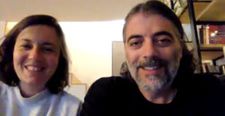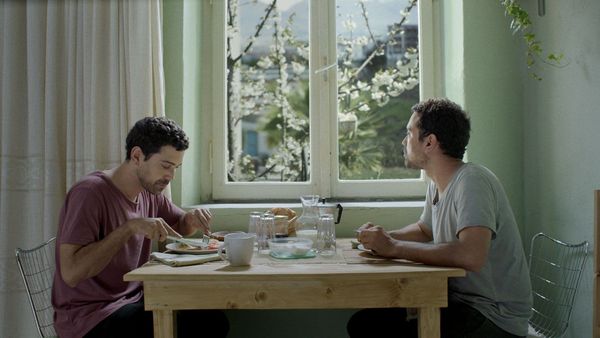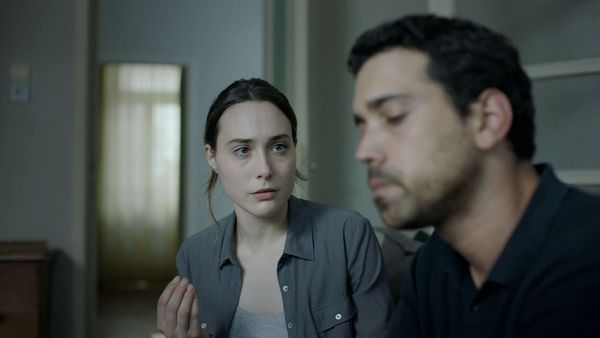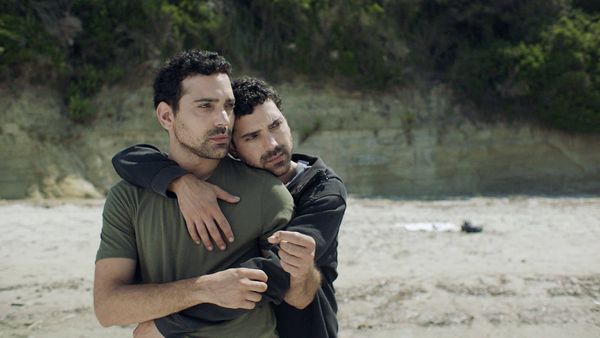We caught up with Koçi and his wife and producing partner Blerina Hankollari shortly after the film, which was Albania’s nomination for the International Feature Oscar, had its world premiere at Tallinn Black Nights Film Festival. Please note that this review goes into some details about the film that might be considered to be slight spoilers, so please proceed with caution.
The film was inspired by a true story, can you tell me a bit about that?
 |
| Blerina Hankollari and Gentian Koçi |
Gentian Koçi: At the time, I was working on my first feature film Daybreak. It was a bit before the shooting and I was in love with the story. So immediately when Blerina told me it, it was with me all the time but I couldn't do this, because when I'm doing one thing, I'm very focused on it, so I wanted to finish Daybreak and start this. But this story stayed with me for a long time inside. In January 2018, I started writing the script. So everything you see is fiction but it’s inspired by a true story.
This film is a double challenge.You're working with that idea of twins, which is quite a visual challenge, I imagine, for a director, in terms of to what degree you're going to distinguish them from each other through the film. But also, that idea of depicting sensory loss is a second challenge.
GK: Yes, honestly, this story challenged me a lot in terms of the style and how I can give life to the story in context of the form and context of the style. I knew from the beginning that it is not easy to shoot, I'm talking about the direction concept.
 |
| Gentian Koçi: 'For me it's very important for people to think after the screening, because if they think, the film will stay with them for a long, long time' Photo: Courtesy of POFF |
But I wanted to challenge myself. So I knew that this is a very deep ocean to go into and to discover new things. It was risky because the story could work very well or maybe not. I'm trying to propose a style, a concept of language of cinema and this story also helped me with that.
Is that because you’re trying to be more visual with your style, because this film relies very heavily on what you can see rather than what you can hear. The sound design is very important but it’s not heavily scripted in the traditional sense.
GK: First, it’s very important to find a unique, strong story. After that when I have the story, I try to write the script. All the noise and sound is in the script. It's a very detailed script. Everything is there from the beginning. Of course. I leave some space for improvisation but I want it to mostly be there in the script. It took me three years to write.
It’s interesting that you have an international cast.
GK: Since they were going to speak in sign language, it gave me the opportunity to cast actors from everywhere. For me, it was a condition because the characters are very deep characters so it was very important to have very good professional film actors. I found Edgar and Rafael Morais and I was very happy. They love the story and it is the first time that they’ve played together in a film. They learned Albanian sign language for six months because for me and Blerina it was very important for the community here that when they go to the theatre, to see the film, they don't need subtitles, but to see the film in their language. So I asked my cast to learn six or seven months of Albanian sign language. And this was another challenging thing.
Without spoiling things, does the end of the movie play differently to a member of the Albanian Deaf community than it does to the rest of the world?
BH: Nobody could understand what they're saying at the end, not even the director.
GK: I wrote that they start using a language of touch but I didn’t put any specific dialogue there. They're transforming their own language since they cannot see any more. So they are trying to transform their sign language into a tactile one. So this is a very personal language between just the two of them. I wanted to have an open ending. For me it's very important for people to think after the screening, because if they think, the film will stay with them for a long, long time.
There's a sort of love triangle in the film, but it's very unconventional. You might expect it to be the two brothers maybe vying for a woman. But here, it's the two brothers with the woman who is sort of the outsider element.
GK:Yeah, this was my intention from the beginning. I don't much like classic things. So yes, Ana is a very special character for me. At the beginning, she was a smaller one because I was more focused on the brothers’ love. But step by step this character was growing very naturally inside me, and in the script. So I started putting more things in for her because I feel she is a very, very deep character. Female characters in my films are very important and very strong. In Ana's case, only she can understand them, and only she stays with them and only she helps them.
How did you work on the sound design for the film, which is so important?
This was from the beginning in the script - the amplified noises. During writing the script, I did some research, and lived a bit with the people who don’t hear. They trusted me and I followed them in their very personal life. So I understood that they produce more noise when they are alone.The style I’m trying to propose is to be very honest with the public. I want the public when they go into a cinema and the light goes down and the film starts to forget the presence of the director in a way and to go deeper and deeper and deeper into the story and to follow the story with their eyes. I’m trying to purify the film language from its artifices.
 |
| Gentian Koçi on Ana: 'Female characters in my films are very important and very strong' Photo: Courtesy of POFF |
I love music and I love when a director uses the music on film. But for me, the music, it's like something that, if a director, or maybe my actors, are not good in front of the camera or at building a very good and strong mis en scene, we ask the help of the music. So for me, this is like the artificial language of cinema in a way, you know. Also camera movement and big light contrast. These are all tools that the director hsa to bring good cinema and, of course, I respect that. But I decided to challenge myself. I told my actors, my DOP and all my crew that we are naked, in a way, in front of the camera, I'm not going to cover you, I'm not going to cover myself either. So we should be 100% real in front of the camera, because I want to go into the theatre to follow the story with their eyes and to forget that they are going to see a movie. This is very difficult in a way to produce this feeling. But I started with Daybreak. Now with this movie, it was more difficult, but I think it works. With my next movie I will try to do the same.
Have any of the Albanian Deaf community seen the film yet?
BH: We collaborated with the national organisation of Deaf people here. And they were all invited to the national premiere here in Albania. I was personally really anxious. And right after the screening, I asked them, ‘Did we make any mistakes?’ They replied, ‘Not at all’. So everything was perfect in terms of the Albanian sign language and they were all very proud of being our collaborators and they helped us a lot with this movie.






















